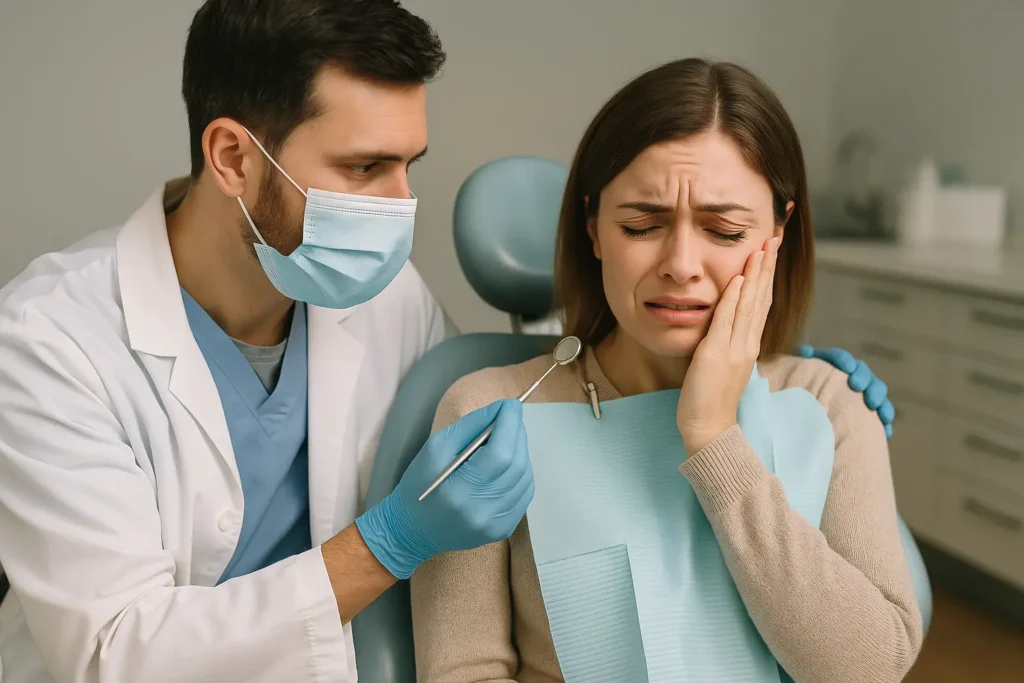
That sharp jolt of pain that makes your stomach drop.
The sound of a crack you didn’t expect.
The sudden rush of fear as you glance in the mirror and whisper, “Oh no… what just happened?”
If you’ve ever had a dental emergency, you know that mix of panic and confusion. It’s not just the pain — it’s the uncertainty, the “what do I do now?” that races through your mind. ❤️
Take a slow breath with me for a second.
You’re here, and that’s already the first step toward getting help.
Let’s walk through this together — calmly, clearly, and compassionately.
💭 So… What Really Counts as a Dental Emergency?
You’d be surprised how often people ask, “Is this serious enough to call a dentist right now?”
And honestly — that’s a very smart question. Not every dental issue means you need to rush out the door, but some absolutely do.
Here’s how to tell the difference 👇
| Situation Type | Key Symptoms | What to Do |
|---|---|---|
| 🚨 True Emergency | Uncontrolled bleeding, severe pain that won’t stop, swelling that affects breathing, a knocked-out adult tooth, or jaw injury. | Call an emergency dentist immediately. If swelling affects breathing, go straight to the ER. |
| ⚠️ Urgent Issue | Dull toothache, cracked tooth with mild pain, lost filling or crown, food stuck between teeth. | Call your dentist for an appointment within 24–48 hours. |
| 🙂 Routine Concern | Minor chip with no pain, light staining, or regular check-up. | Schedule a non-urgent visit at your convenience. |
If you’re in doubt, call anyway.
Most dental offices have emergency lines and can help you decide whether to come in or wait until morning.
And remember — calling doesn’t make you dramatic. It makes you responsible. 💪
⏱️ The Knocked-Out Tooth: Every Minute Matters
Picture this: you’re playing with your kids, someone accidentally bumps your mouth, and suddenly… your tooth is on the floor.
It’s one of those moments that can make your heart pound — but here’s the good news: if you act fast, you might actually save that tooth.
Here’s exactly what to do:
- Find it right away. Don’t waste a minute.
- Hold it by the crown (the part you chew with) — never the root.
- If dirty, rinse gently with milk or your own saliva (not water!).
- Try to reinsert it carefully into the socket, if you can.
- If you can’t, keep it moist — ideally in milk or a tooth preservation kit.
- Call your emergency dentist immediately.
Time matters: under 60 minutes gives you the best chance to save it.
✨ Quick dentist tip:
“The most common mistake? People scrub the tooth clean. Don’t! Those tiny fibers on the root are what help it reattach. Handle it gently and keep it wet — that’s what saves it.”
😖 The Throbbing Toothache That Won’t Quit
If you’ve ever lain awake because of that deep, pulsing pain in your jaw — you know how it feels.
It’s not just annoying; it’s exhausting.
That kind of pain often points to an infection inside your tooth (an abscess). It’s not something you can ignore — the infection can spread quickly.
Here’s what you can do right now:
- Rinse with warm salt water to soothe and clean.
- Floss carefully to remove trapped food.
- Apply a cold compress outside your cheek.
- Never put aspirin directly on your gum — it can burn tissue.
- And most importantly, call your dentist or use an Emergency Dentist Near Me locator.
If you notice swelling, fever, or difficulty swallowing, go to the ER immediately. Your health — not just your tooth — could be at risk. ❤️
💔 Cracked, Chipped, or Broken Tooth — What Now?
One minute you’re crunching ice or biting a popcorn kernel… the next, you feel that awful edge.
It happens to everyone at some point.
The urgency depends on how deep the crack goes:
- Tiny chip? You’re okay for a day or two — but still schedule a visit.
- Large break or pain when you bite? That’s urgent — the inner layers might be exposed.
- Crack under the gumline? That’s serious and needs same-day care.
🦷 While you wait: rinse with warm water, use gauze if there’s bleeding, and keep the area clean.
Bring any broken piece to the dentist. Sometimes, it can be bonded back — yes, really.
👑 Lost Filling or Crown (The Weird “Something’s Missing” Feeling)
You’re chewing and suddenly — crunch. Something hard that shouldn’t be there.
When you look closer, you realize your crown or filling is gone. 😬
If it’s not painful, you’re safe for a short while. But exposed teeth can become sensitive fast, so don’t wait too long.
Temporary fix:
- Clean the crown.
- Place it back using dental cement or sugar-free gum (yes, that works in a pinch).
- Avoid hot, cold, or sticky foods.
- Call your dentist to have it properly restored.
Never use super glue. (Yes, people try it!)
🌙 How to Find an Emergency Dentist — Even at 2 AM
This is the part that scares most people: it’s late, you’re in pain, and every office seems closed.
Here’s how to find real help fast — without panic:
- Call your usual dentist first. Many have after-hours instructions or partner clinics.
- Use a trusted locator service.
You can quickly find nearby professionals through Dentist Near Me. - Check with local hospitals. Some ERs have dental departments or on-call oral surgeons.
- Ask for a referral. Urgent-care centers and pharmacists often know who’s available late.
When you call, ask:
- “Do you treat knocked-out teeth or abscesses?”
- “Do you accept emergency walk-ins?”
- “What are your payment options?”
Those answers tell you everything you need to know.
✅ Before You Leave Home: Quick Checklist
- ☎️ Call ahead and confirm they can see you.
- 🪪 Bring ID and insurance (if you have it).
- 💊 Write down all medications you take.
- 📝 Note when the pain started and what triggers it.
- 🚗 Ask someone to drive if you’re in pain or anxious.
- 🦷 Bring the tooth or crown in milk or saline.
Being ready helps your dentist treat you faster — and more comfortably. 💙
💰 Let’s Talk About the Cost (and How to Make It Manageable)
Money worries stop a lot of people from calling sooner — and that’s completely understandable.
Emergency visits can be pricey, but there are real ways to make them affordable.
| Service | Average Cost (U.S.) |
|---|---|
| Emergency Exam | $100 – $250 |
| X-ray | $30 – $50 |
| Simple Extraction | $150 – $400 |
| Surgical Extraction | $250 – $650 |
| Root Canal (Front) | $700 – $1,500+ |
| Root Canal (Molar) | $1,000 – $2,500+ |
| Dental Crown | $800 – $2,000+ |
Ways to Save 💡
💙 Use a Dental Discount Plan
Programs like Dental Discount offer immediate savings — often 40 – 60 % off procedures — with no waiting periods.
💳 Ask About Financing
Many offices partner with lenders so you can split payments over time. Explore options via our Dental Loans page.
📞 Be Honest About Budget
Dentists genuinely want to help. Telling them upfront lets the team find flexible solutions.
The bottom line? Don’t delay care because of cost. Pain and infection only grow — and quick action almost always costs less later.

🩺 What to Expect When You Arrive
Walking into the clinic, heart racing a bit? That’s completely normal. Most people feel that mix of fear and relief — finally, someone’s going to fix this.
Here’s how your visit usually goes:
- Check-in: Quick paperwork about your health and what happened.
- Exam & X-ray: The dentist focuses right on the problem area.
- Diagnosis: They’ll explain what’s wrong and show you the X-ray.
- Pain Relief: You’ll get numbed or medicated right away.
- Treatment: That might mean a temporary filling, root canal start, or extraction.
- Home Care Guidance: Clear instructions, meds, and follow-up details.
You’ll likely walk out feeling 10 pounds lighter — and finally able to smile again. 😊
If anxiety ever holds you back, you might find comfort in our gentle guide on Dental Anxiety Explained. You’re not alone in that fear — and modern dentistry is more compassionate than ever.
💪 Preventing Future Dental Emergencies
You can’t avoid every accident — but you can prevent many.
Here’s how to protect that smile:
- 🦷 Regular check-ups every 6 months catch small problems early.
- 🛡️ Mouthguards for sports. The American Dental Association explains why custom ones work best.
- 🍿 Avoid hard foods like ice, nuts, and unpopped kernels.
- 🚫 Don’t use your teeth as tools (we all do it once — and regret it).
- 💧 Stay hydrated to protect enamel and gums.
Small habits prevent big emergencies — it’s really that simple.
💬 Need Advice Right Now?
If you’re unsure what’s happening, you can chat instantly with licensed professionals through Dental Experts Online.
They’ll look at photos, answer questions, and help you decide what to do next — no waiting room needed.
Sometimes just hearing a calm, informed voice makes everything easier. ❤️

🌤️ From Panic to Peace
Dental emergencies test your nerves — but they don’t have to break your spirit.
The moment you reach out for help, you’ve already shifted from fear to action.
You’ve got this. Truly.
Your smile can be saved, your pain can be relieved, and your confidence will return — faster than you think.
So take that deep breath again.
Pick up the phone.
Relief is one call away. 😊💙
Medical Disclaimer: Content on HiTechDental.info is for educational purposes only and not a substitute for examination or diagnosis by a licensed dentist. If you experience pain, swelling, or urgent symptoms, seek professional care immediately.
Affiliate Disclosure: HiTechDental.info participates in affiliate programs (including Amazon and other trusted partners). When you buy through our links, we may earn a small commission — at no extra cost to you. These partnerships help keep our guides accurate, independent, and free for readers.
© 2025 HiTechDental.info | All rights reserved.